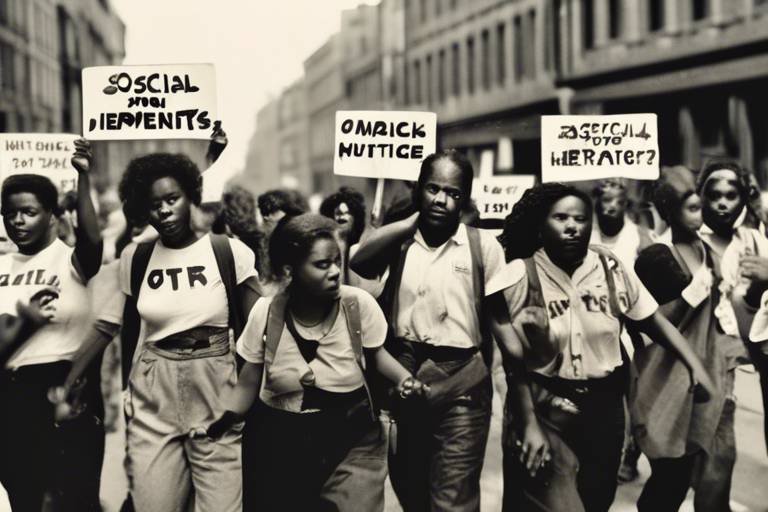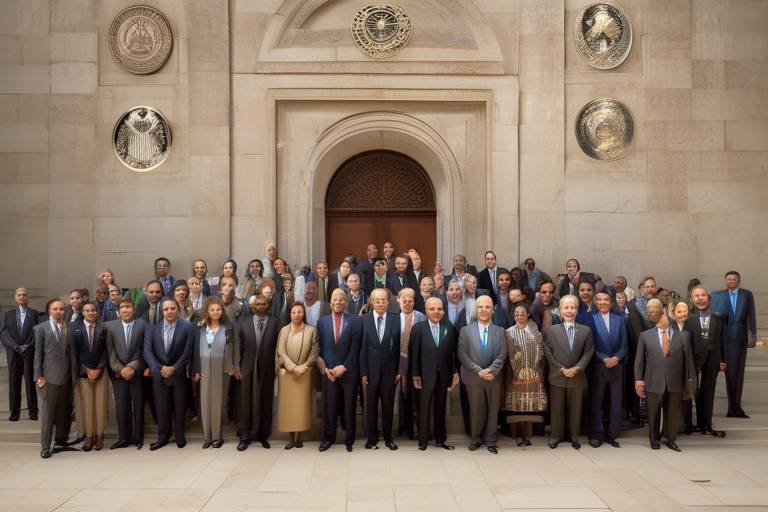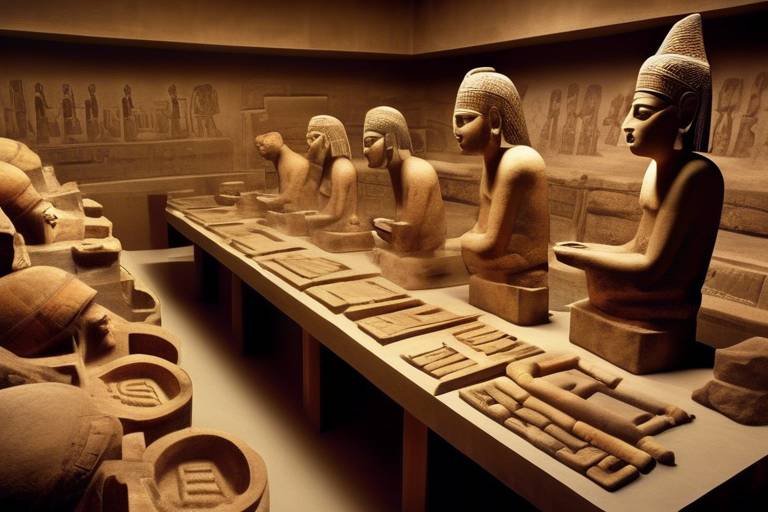The Importance of Ancestor Worship in Ancient Cultures
Exploring the significance of ancestor worship in ancient societies reveals a profound connection between the past and the present. Ancestor worship, a practice deeply rooted in honoring deceased family members, served as a cornerstone of cultural identity and spiritual beliefs. Through rituals and ceremonies, ancient civilizations paid homage to their ancestors, seeking guidance, protection, and blessings from the realm of the departed.
Understanding the concept of ancestor worship unveils a rich tapestry of traditions and customs that shaped the social fabric of ancient cultures. The act of revering ancestors transcended mere remembrance; it symbolized a spiritual bond that transcended time and space, fostering a sense of continuity and belonging among community members.
Tracing the historical origins of ancestor worship reveals its prevalence in diverse ancient civilizations, from the elaborate tombs of Egypt to the ancestral shrines of China. These practices evolved over time, intertwining with cultural norms and beliefs to form a complex tapestry of rituals and ceremonies that permeated every aspect of daily life.
The cultural significance of ancestor worship manifested in various forms, influencing art, architecture, and societal norms. From elaborate funerary rites to intricate ancestral portraits, ancient cultures expressed their reverence for the deceased through creative endeavors that immortalized their legacy for future generations.
Exploring the spiritual beliefs associated with ancestor worship unveils a profound connection between the living and the dead. Rituals and offerings served as a bridge between the earthly realm and the afterlife, ensuring the continued presence and influence of ancestors in the lives of their descendants.
Moreover, ancestor worship fostered social cohesion by promoting a sense of community, identity, and continuity among ancient societies. By honoring their forebears, individuals forged bonds with their past, present, and future, creating a shared narrative that bound them together in a web of familial and cultural ties.
Analysing the impact of ancestor worship on governance reveals its influence on political structures, leadership succession, and decision-making in ancient civilizations. Rulers often legitimized their authority through ancestral lineage, invoking the wisdom and blessings of past rulers to guide their actions and policies.
The legacy of ancestor worship continues to shape contemporary cultural practices, traditions, and religious beliefs. While modern societies have faced challenges in preserving and adapting these ancient traditions, the essence of honoring one's ancestors remains a timeless and universal practice that transcends cultural boundaries.
In conclusion, the importance of ancestor worship in ancient cultures lies not only in its historical significance but also in its enduring impact on the collective memory and identity of societies throughout the ages. By honoring the past, we illuminate the path to the future, forging a link between generations that transcends the boundaries of time and space.

Definition of Ancestor Worship
Exploring the significance of ancestor worship in ancient societies and its impact on cultural practices, beliefs, and social structures.
Understanding the concept of ancestor worship is essential to grasp its profound influence on ancient cultures. Ancestor worship is the veneration and homage paid to deceased family members as a way to honor their memory and seek their guidance and blessings. This practice involves rituals, prayers, and offerings to connect with the spirits of the ancestors and maintain a relationship with them beyond death.

Historical Origins
Exploring the significance of ancestor worship in ancient societies and its impact on cultural practices, beliefs, and social structures.
Understanding the concept of ancestor worship and its role in honoring and revering deceased family members.
When delving into the historical origins of ancestor worship, we uncover a tapestry of diverse practices across various ancient civilizations. From the elaborate rituals of the Egyptians, who believed in the eternal existence of the soul, to the ancestral veneration of the Chinese, where filial piety was paramount, the roots of ancestor worship run deep in human history. These practices evolved over time, intertwining with cultural norms and societal structures to form a profound connection between the living and the dead.
Examining how ancestor worship rituals influenced art, architecture, and daily life in ancient cultures.
Exploring the spiritual beliefs and rituals associated with ancestor worship and their role in connecting the living with the deceased.
Discussing how ancestor worship fostered a sense of community, identity, and continuity among ancient societies.
Analyzing how ancestor worship influenced political structures, leadership succession, and decision-making in ancient civilizations.
Examining the legacy of ancestor worship in contemporary cultural practices, traditions, and religious beliefs.
Exploring the challenges faced by modern societies in preserving and adapting ancestor worship traditions in a rapidly changing world.
Stay tuned for the answers to commonly asked questions about ancestor worship and its enduring legacy in ancient and modern societies.

Cultural Significance
Exploring the significance of ancestor worship in ancient societies and its impact on cultural practices, beliefs, and social structures.
The cultural significance of ancestor worship in ancient societies cannot be overstated. It was deeply ingrained in the fabric of these civilizations, shaping their art, architecture, and daily life. Through elaborate rituals and ceremonies, ancestors were honored and revered, their spirits believed to play a vital role in the lives of the living.
Artistic expressions such as sculptures, paintings, and pottery often depicted scenes of ancestor veneration, showcasing the importance of family lineage and heritage. Architectural marvels like grand tombs and temples were built as tributes to ancestors, serving as places of worship and remembrance.
Moreover, ancestor worship influenced social interactions and norms, fostering a sense of unity and continuity within communities. By maintaining a connection with their ancestors, ancient cultures believed they were preserving their traditions and values for future generations.
This cultural practice not only provided a sense of identity and belonging but also served as a source of inspiration for creativity and innovation. Through honoring their ancestors, ancient societies found a way to bridge the gap between the past and the present, creating a harmonious balance between tradition and progress.
Overall, the cultural significance of ancestor worship in ancient cultures was profound, shaping the way people lived, thought, and interacted with one another.
1. What is the origin of ancestor worship in ancient societies?
2. How did ancestor worship influence artistic expressions in ancient civilizations?
3. What role did ancestor worship play in social cohesion among ancient communities?
4. How has the legacy of ancestor worship impacted modern cultural practices?

Spiritual Beliefs
When delving into the realm of spiritual beliefs associated with ancestor worship in ancient cultures, we uncover a rich tapestry of traditions and rituals that served as a bridge between the living and the deceased. These beliefs were deeply rooted in the idea that the spirits of ancestors continued to influence the lives of their descendants, offering guidance, protection, and blessings from the afterlife.
Central to these spiritual beliefs was the notion of maintaining a harmonious relationship with the ancestral spirits through offerings, prayers, and ceremonies. It was believed that by honoring and appeasing the ancestors, individuals could ensure their continued support and goodwill in various aspects of life, such as health, prosperity, and success.
Rituals surrounding ancestor worship often involved the construction of elaborate altars or shrines dedicated to deceased family members, where offerings of food, incense, and other symbolic items were made as a sign of respect and reverence. These practices not only served as a way to honor the past but also to seek blessings and protection for the present and future.
The spiritual beliefs associated with ancestor worship also played a significant role in shaping moral values and ethical conduct within ancient societies. The idea of upholding the legacy and honor of one's ancestors instilled a sense of duty and responsibility among individuals to live virtuous lives and uphold the values passed down through generations.
Furthermore, these beliefs fostered a sense of interconnectedness and continuity between the living and the dead, emphasizing the cyclical nature of life and the importance of ancestral lineage in shaping one's identity and destiny. By maintaining a strong connection with their ancestors, ancient cultures believed they could tap into a source of wisdom and guidance that transcended the boundaries of mortality.

Social Cohesion
When delving into the realm of ancient cultures, one cannot overlook the profound impact of ancestor worship on social cohesion. This practice, deeply rooted in honoring and revering deceased family members, served as a cornerstone in fostering a sense of community and identity within these societies. Imagine a tapestry intricately woven with threads of familial ties, binding individuals together across generations like a tightly knit fabric.
Through ancestor worship, ancient communities found a common thread that connected them to their past, present, and future. It was not merely a ritualistic practice but a profound belief system that instilled a sense of continuity and belonging among members. Just as a tree draws nourishment from its roots, these societies drew strength and unity from their shared reverence for their ancestors.
Picture a village gathering around a sacred altar, offering prayers and tributes to their forebears, each gesture reinforcing the bonds that held them together. The rituals and ceremonies associated with ancestor worship were not just symbolic gestures but tangible expressions of solidarity and mutual respect. They served as a reminder of the interconnectedness of all members, regardless of their individual roles or status.
Moreover, ancestor worship transcended mere familial connections to encompass the entire community. It was a unifying force that bridged gaps, resolved conflicts, and upheld traditions that defined the collective identity of these ancient societies. Like a beacon in the night, the practice of ancestor worship illuminated the path toward social harmony and cohesion.
In essence, ancestor worship was more than a cultural practice; it was a social glue that bound individuals together in a shared narrative of the past. It provided a sense of belonging, purpose, and direction to these ancient communities, fostering a collective consciousness that transcended individual differences and divisions. Through honoring their ancestors, these societies found strength in unity and resilience in their shared heritage.

Impact on Governance
When delving into the impact of ancestor worship on governance in ancient civilizations, one can uncover a fascinating interplay between spiritual beliefs and political structures. In many societies, the veneration of ancestors played a crucial role in legitimizing leadership and shaping decision-making processes. Leaders often claimed divine descent from revered ancestors, solidifying their authority and justifying their rule.
Moreover, ancestor worship served as a unifying force within communities, fostering a sense of shared identity and collective purpose. By honoring their forebears through elaborate rituals and offerings, ancient societies reinforced social cohesion and strengthened the bonds among community members. This communal reverence for ancestors extended to governance, influencing the selection of leaders and the resolution of conflicts.
Furthermore, the practice of ancestor worship provided a framework for succession planning and governance continuity. In many cultures, the eldest male descendant of a revered ancestor was often chosen as the next leader, ensuring a smooth transition of power and maintaining stability within the society. This hereditary system of governance, rooted in ancestral reverence, helped establish a sense of order and predictability in the political realm.
As a result, ancestor worship not only shaped the spiritual and cultural landscape of ancient civilizations but also left a lasting imprint on their governance structures. The intertwining of religious beliefs, social customs, and political governance highlights the intricate relationship between ancestral veneration and the exercise of power in ancient societies.

Modern Influences
Modern influences play a significant role in shaping contemporary cultural practices, traditions, and religious beliefs. The legacy of ancestor worship continues to impact modern societies in various ways, reflecting the deep-rooted connection between past traditions and present-day customs. In today's world, the influence of ancestor worship can be seen in the preservation of ancestral rituals, the celebration of ancestral festivals, and the maintenance of ancestral shrines.
Moreover, the modern interpretation of ancestor worship has evolved to encompass a broader understanding of lineage, heritage, and familial connections. Many individuals still pay homage to their ancestors through prayers, offerings, and ceremonies, seeking guidance, blessings, and protection from their forebears. This practice not only honors the memory of the deceased but also reinforces the bonds between generations and strengthens the sense of belonging within families and communities.
Furthermore, the influence of ancestor worship extends beyond familial relationships to impact societal values, ethical principles, and cultural norms. The respect for ancestors instilled through traditional practices serves as a moral compass for individuals, guiding their actions and decisions based on the teachings and wisdom passed down through generations. This ethical framework rooted in ancestral reverence fosters a sense of responsibility, accountability, and respect for one's heritage and legacy.

Challenges and Adaptations
Exploring the significance of ancestor worship in ancient societies and its impact on cultural practices, beliefs, and social structures.
Understanding the concept of ancestor worship and its role in honoring and revering deceased family members.
Tracing the roots of ancestor worship practices in different ancient civilizations and their evolution over time.
Examining how ancestor worship rituals influenced art, architecture, and daily life in ancient cultures.
Exploring the spiritual beliefs and rituals associated with ancestor worship and their role in connecting the living with the deceased.
Discussing how ancestor worship fostered a sense of community, identity, and continuity among ancient societies.
Analyzing how ancestor worship influenced political structures, leadership succession, and decision-making in ancient civilizations.
Examining the legacy of ancestor worship in contemporary cultural practices, traditions, and religious beliefs.
Adapting ancestor worship traditions in modern society presents various challenges. One significant challenge is the shift towards individualism and secularism, which can diminish the importance of ancestral rituals. Additionally, globalization and urbanization have led to the dispersion of families, making it harder to maintain traditional practices. To adapt, some communities have incorporated technology, such as online memorials and virtual ceremonies, to continue honoring their ancestors in a digital age. Balancing ancient customs with the demands of modern life requires creativity and flexibility to ensure the preservation of ancestral heritage.
Coming soon...
Frequently Asked Questions
- What is ancestor worship?
Ancestor worship is a cultural practice where deceased family members are honored and revered through rituals and offerings.
- Which ancient civilizations practiced ancestor worship?
Ancient civilizations such as the Egyptians, Chinese, Romans, and Greeks all had traditions of ancestor worship as a way to connect with their past and ensure the well-being of their ancestors in the afterlife.
- How did ancestor worship influence daily life in ancient cultures?
Ancestor worship rituals influenced various aspects of daily life including art, architecture, social norms, and religious practices, shaping the cultural identity of these societies.
- What role did ancestor worship play in social cohesion?
Ancestor worship fostered a sense of community and belonging, reinforcing social bonds and providing a shared cultural heritage that united members of ancient societies.
- How did ancestor worship impact political structures in ancient civilizations?
Ancestor worship often influenced leadership succession, governance decisions, and the legitimacy of rulers, shaping the political landscape of ancient societies.
- What challenges do modern societies face in preserving ancestor worship traditions?
Modern societies struggle with adapting ancestor worship practices to contemporary lifestyles, balancing tradition with the demands of a rapidly changing world while maintaining cultural heritage.



















